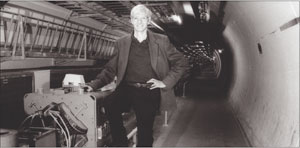Will the LHC surprise us? I hope so. Having failed to find any completely unexpected new physics for more than 30 years, we clearly need nature’s help to progress, and the case is good.

The last really big surprise in particle physics was the discovery of the third charged lepton (the tau) in 1975. There have of course been many extremely important discoveries since then, and our understanding of particle physics has advanced enormously. But the only real surprises have been how well the Standard Model has worked, the accuracy with which experiments have been able to check its predictions, and the failure to find its missing ingredient (the mechanism that gives particles their masses: Higgs?), or any other physics beyond the Standard Model, apart from the major discovery of neutrino masses (which, however, was not a huge surprise as no principle required zero mass).
By the time of the major LEP summer study in 1978 the Standard Model was accepted by many, but by no means all, theorists and gaining supporters among experimenters. It was thought that “the (CERN) proton–antiproton collider [which had just been launched] should discover the Z, but apart from measuring its mass (with considerable errors) it will not allow us to investigate its properties in detail (it may also discover the W but this looks more difficult)”. It was argued that LEP1 would be needed to study the Z in detail (or, if it did not exist, discover what else damps the rising weak cross section at LEP energies, where the phenomenological low energy theory had to be wrong), and measure the number of neutrinos into which it can decay; LEP2 would be needed to study the W, and find the Higgs boson (or whatever else generates masses) if it had not been found at LEP1. The surprises (at least for theorists like me) were how easy it was to detect the W (which was discovered in 1983, shortly before the Z) and the accuracy of the LEP results, which led to the exciting discovery that the strengths of the electromagnetic and strong forces converge at high energies, supporting the idea that they are different manifestations of a single “grand unified” force.
At the 1978 LEP summer study the importance of insisting on a relatively long tunnel in order not to compromise the energy of a later proton accelerator or LHC was discussed, and this argument was used when LEP was approved in 1981. The first serious discussion of LHC physics took place in 1984. It was obvious that the time had come to launch R&D on LHC magnets but “less clear whether it is sensible to discuss (LHC) physics…without more complete results from the SPS collider, let alone data from LEP, SLC and HERA…crystal gazing is unusually hazardous following recent tantalizing hints of new discoveries from UA1 and UA2”. These hints, which turned out to be spurious (along with other hints of non-standard physics, from Fermilab neutrino experiments, LEP, and other experiments), remind us of the difficulty of exploring the frontier: we should not be surprised if there are false dawns at the LHC.

In 1984 it was stressed that the physics of mass generation was almost certain to be discovered at the LHC, if the question had not been settled at LEP, and that there are good reasons for expecting physics beyond the Standard Model in the LHC energy range – perhaps supersymmetry, which was discussed in some detail (it was only mentioned briefly at the 1978 summer study, although in the event a huge effort went into unsuccessful searches for supersymmetry at LEP). The case for the LHC was developed in more detail during the 1980s, but its essence has not changed.
The formal proposal to build the LHC presented to the CERN Council in 1993 was introduced with the statement that it will “provide an unparalleled ‘reach’ in the search for new fundamental particles and interactions between them, and is expected to lead to new, unique insights into the structure of matter and the nature of the universe”. The LHC will take us a factor of 10 further in energy (at the level of the proton’s constituents) or equivalently to a tenth of the distance scale that has been explored so far. This alone is enough to whet scientific appetites. But pulses are really set racing by the knowledge that the LHC has a good chance of finding what generates masses (a single elementary Higgs field? Multiple or composite Higgs fields?…?) and may cast light on other mysteries, including: why the mass of the W is so small compared to the scale of the proposed grand unification of electroweak and strong interactions, the magnitude of the asymmetry between matter and anti-matter in the universe, the number of quarks and leptons, and the origin of the dark matter and dark energy that pervade the universe.
What do I expect? I am fairly confident that Higgs, in some form, will show up. If the LHC finds the standard Higgs boson and nothing else I would be extremely disappointed as we would learn essentially nothing. (The biggest surprise would be to find nothing, which would take us nowhere, while making the case for going to much higher energies compelling but probably impossible to sell.) I think there is a reasonable probability that supersymmetry will be found, and I hope this happens: the most convincing arguments are that it is the only possible symmetry allowed by quantum field theory (the mathematical language of particle physics) that has not been found (why would nature utilise all possibilities but one?); “local” supersymmetry (and all the other “continuous” symmetries are local) requires the existence of gravity; and the idea of connecting matter (fermions) with force carriers (bosons) is very appealing, although against this must be set the extravagant proliferation of particles (none found, yet?) that this implies. I am somewhat less impressed by the fact that supersymmetry would stabilize the mass of the W, which is one of the arguments that could put supersymmetry in reach of the LHC.
Thanks to the dedication of the CERN staff the LHC is now starting, and thanks to the community of users around the world, the experiments are ready to take data. It is a fantastic project. I am confident that it will work superbly. I am almost certain that it will make important discoveries, and I hope they will include surprises.







